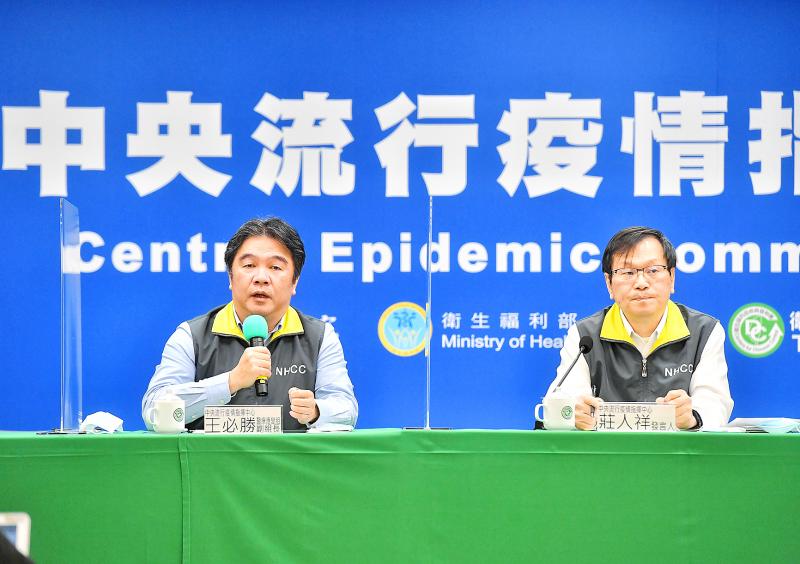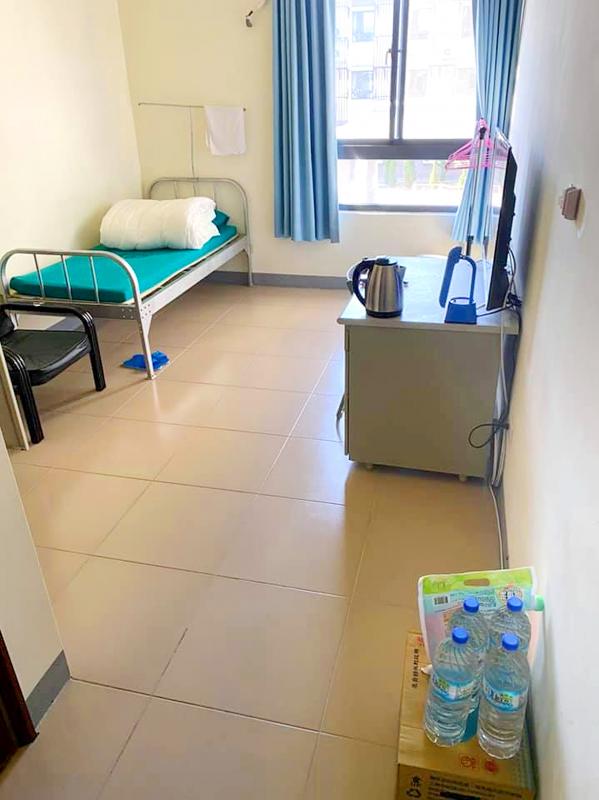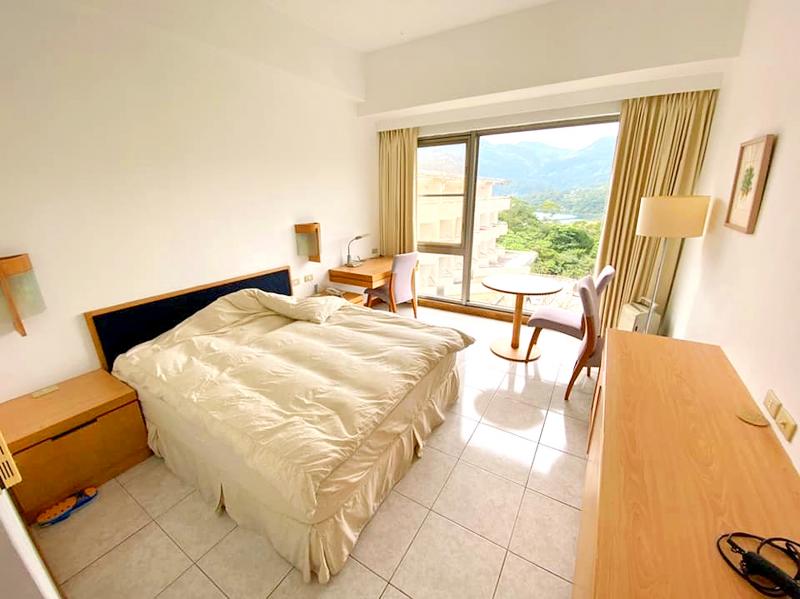About 46 percent of the government’s quarantine rooms made available for returning residents were booked on the first day they were open for reservation, the Central Epidemic Command Center (CECC) said yesterday, as it reported three new imported cases of COVID-19.
Tightened quarantine regulations, requiring inbound passengers to be mainly quarantined in hotels and centralized facilities, or “one person per housing unit” if in private housing, are to be implemented from Friday.
The CECC on Wednesday announced that it would make 1,500 to 2,000 centralized quarantine facility rooms available to returning Taiwan residents, as the Lunar New Year holiday nears, and on 8pm Friday launched an online application system.

Photo: CNA
This year’s Lunar New Year holiday begins on Feb. 11.
Hospital and Social Welfare Organizations Administration Commission Director Wang Pi-sheng (王必勝), who is also deputy head of the CECC’s medical response division, said that as of 12pm yesterday, 685 people had applied to book centralized quarantine rooms.
“We released 1,500 rooms in the first stage, so they account for about 46 percent of the capacity,” he said, adding that the booking process on the first day of applications was smooth and the center did not receive any complaints.

Photo: Screen grab from Facebook
The rooms have been reserved for people arriving between Tuesday and Jan. 26, but most bookings were for people arriving on Jan. 23 and Jan. 24, and the majority of them are Taiwanese living in China.
Local Chinese-language media reported that an online chat group for Taiwanese living in China on Thursday posted three photographs of Taiwan’s centralized quarantine facility rooms, sparking complaints that the rooms looked like “prison” cells and “the room environment is too poor for NT$2,000 per day.”
Wang yesterday posted on Facebook four photographs of different rooms from the centralized quarantine facilities, saying that the styles of the rooms are diverse.

Photo: Screen grab from Facebook
However, the purpose of the rooms is to provide a person with a safe, clean environment with their own bathroom, while ensuring strict infection control measures and health monitoring, he said.
About 90 to 95 percent of the people who have stayed at the centralized quarantine facilities were satisfied with their stay, he added.
Separately, Centers for Disease Control Deputy Director-General Chuang Jen-hsiang (莊人祥), who is the CECC’s spokesman, said one of the new imported cases yesterday is an Indonesian fisher in his 30s.
The man arrived in Taiwan on Dec. 23 without symptoms, but the results of a self-paid test he took on Thursday came back positive yesterday.
The other two cases are migrant workers from the Philippines — a woman in her 20s who arrived on Dec. 13 and a man in his 30s who arrived on Dec. 18, Chuang said, adding that they had no symptoms and had tested negative upon ending centralized quarantine on Dec. 27 and Wednesday last week respectively.
The two stayed in single rooms for the additional seven-day self-health management period, and they were tested on Thursday and Friday, the results of which came back positive yesterday, Chuang said.
A total of 828 confirmed cases have been reported in Taiwan, and 101 of those infected remain in hospitals, he said.

FALSE DOCUMENTS? Actor William Liao said he was ‘voluntarily cooperating’ with police after a suspect was accused of helping to produce false medical certificates Police yesterday questioned at least six entertainers amid allegations of evasion of compulsory military service, with Lee Chuan (李銓), a member of boy band Choc7 (超克7), and actor Daniel Chen (陳大天) among those summoned. The New Taipei City District Prosecutors’ Office in January launched an investigation into a group that was allegedly helping men dodge compulsory military service using falsified medical documents. Actor Darren Wang (王大陸) has been accused of being one of the group’s clients. As the investigation expanded, investigators at New Taipei City’s Yonghe Precinct said that other entertainers commissioned the group to obtain false documents. The main suspect, a man surnamed

DEMOGRAPHICS: Robotics is the most promising answer to looming labor woes, the long-term care system and national contingency response, an official said Taiwan is to launch a five-year plan to boost the robotics industry in a bid to address labor shortages stemming from a declining and aging population, the Executive Yuan said yesterday. The government approved the initiative, dubbed the Smart Robotics Industry Promotion Plan, via executive order, senior officials told a post-Cabinet meeting news conference in Taipei. Taiwan’s population decline would strain the economy and the nation’s ability to care for vulnerable and elderly people, said Peter Hong (洪樂文), who heads the National Science and Technology Council’s (NSTC) Department of Engineering and Technologies. Projections show that the proportion of Taiwanese 65 or older would

Democracies must remain united in the face of a shifting geopolitical landscape, former president Tsai Ing-wen (蔡英文) told the Copenhagen Democracy Summit on Tuesday, while emphasizing the importance of Taiwan’s security to the world. “Taiwan’s security is essential to regional stability and to defending democratic values amid mounting authoritarianism,” Tsai said at the annual forum in the Danish capital. Noting a “new geopolitical landscape” in which global trade and security face “uncertainty and unpredictability,” Tsai said that democracies must remain united and be more committed to building up resilience together in the face of challenges. Resilience “allows us to absorb shocks, adapt under

Taiwan Semiconductor Manufacturing Co (TSMC, 台積電) yesterday said it is building nine new advanced wafer manufacturing and packaging factories this year, accelerating its expansion amid strong demand for high-performance computing (HPC) and artificial intelligence (AI) applications. The chipmaker built on average five factories per year from 2021 to last year and three from 2017 to 2020, TSMC vice president of advanced technology and mask engineering T.S. Chang (張宗生) said at the company’s annual technology symposium in Hsinchu City. “We are quickening our pace even faster in 2025. We plan to build nine new factories, including eight wafer fabrication plants and one advanced